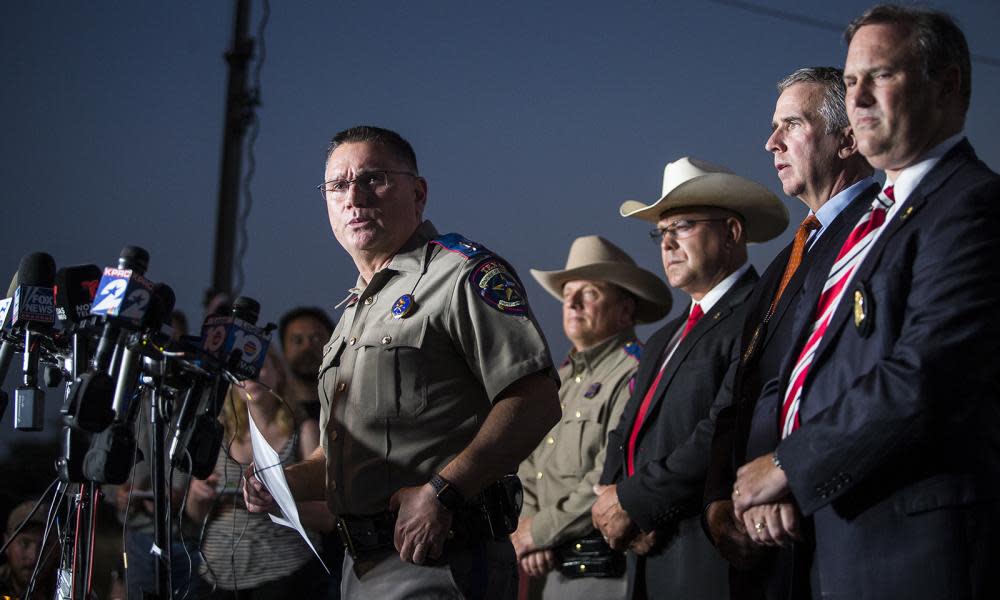Texas officials opt not to use gunman's name: 'We do not want to glorify him'

In a Monday media briefing less than 24 hours after a gunman killed 26 worshippers and wounded 20 others at a small Baptist church in rural Texas, authorities provided their first detailed account of the killer’s motives and methods and formally identified him.
But in an evening update, as information continued to emerge about Devin Kelley’s tactics and his name and pictures proliferated as reporters dug into his background, officials said they would no longer refer to the 26-year-old by name.
“Today the autopsy was performed on the shooter – and if you notice I use ‘shooter’ instead of the suspect’s name, we do not want to glorify him and what he’s done,” said Freeman Martin, a spokesman for the Texas department of public safety.
“Certainly don’t want to glorify what has happened. There is a couple of campaigns out there, one is called Don’t Name Them, we don’t talk about the shooter, we don’t see his name out there in the press so it doesn’t encourage other people to do horrific acts like this,” said Chris Combs, an FBI special agent.
Mass shootings in the US are becoming more deadly and more frequent. The massacre at the First Baptist church in Sutherland Springs, near San Antonio, follows the killing of 58 people at a music concert in Las Vegas by a lone gunman on 1 October, and the slaughter of 49 people at a nightclub in Orlando in June 2016.
Research by Sherry Towers at Arizona State University in 2015 found evidence of a “contagion effect” where widely publicized killings inspire copycat events.
Groups such as No Notoriety and Don’t Name Them, a campaign by the Advanced Law Enforcement Rapid Response Training (Alerrt) Center at Texas State University, hope to reduce the frequency of mass shootings by encouraging the media and law enforcement to end what they see as gratuitous and harmful coverage that serves to elevate perpetrators and inspire others.
Diana Hendricks, director of communications for the Alerrt centre, said she was encouraged by the decision of the officials in Texas. “It can help to, if not eliminate, then tamp down the contagion effect where people follow these stories,” she said. When authority figures such as politicians namecheck murderers, she added, “They don’t deserve that sound clip.”
Hendricks, herself an experienced journalist, said that she understands the need for reporters to write detailed accounts of significant events. But, she said: “Why do [audiences] need to know every detail about the shooter? Is it just curiosity, like looking at a wreck on the highway? Here are some better options – the victims, the survivors, the heroes, the resilience and recovery projects that happen afterwards.”
One concerning aspect to the coverage of the Sutherland Springs and Las Vegas tragedies, she said, is the description of them as record-setting because of the body counts. “When you give things this badge of dishonour it sets a bar for the next one,” she said.
Tom and Caren Teves founded No Notoriety in 2012 immediately after their son, Alex Teves, died in the movie theatre shooting in Aurora, Colorado, that claimed 12 lives and injured 70 people.Caren Teves said that asking the authorities not to repeatedly refer to shooters by name is “Something that we have been working on because this is a matter of public safety. We also have endorsements from several law enforcement agencies that agree with us and are pushing the issue as well.”
The groups say that they are not advocating censorship, simply asking media outlets to be more careful about the stories they tell and they way they tell them - for example, by not publishing photographs of killers posing with guns. “We just don’t want to turn that person into a star,” said Pete Blair, the executive director of the Alerrt centre.
Caren Teves said: “The media glorifies or lends infamy to these shooters, it creates a call to action for those vile individuals that are either in the planning stage or on the line of whether to act or not. This throws them right over the line into action.”
“The shooters themselves are telling us this. They’re leaving behind evidence that shows that they studied previous mass shootings,” said Anita Busch, the cousin of Micayla Medek, who also died in the Aurora massacre.
The group’s website lists 10 recent mass shootings in the US where there is evidence that the perpetrators sought celebrity and were influenced by past atrocities and their coverage, including the fatal shootings of nine people at a community college in Oregon in 2015.
The gunman wrote of others on his blog: “A man who was known by no one, is now known by everyone, his face splashed across every screen, his name across the lips of every person on the planet, all in the course of one day. Seems like the more people you kill, the more you’re in the limelight.”

 Yahoo News
Yahoo News 
